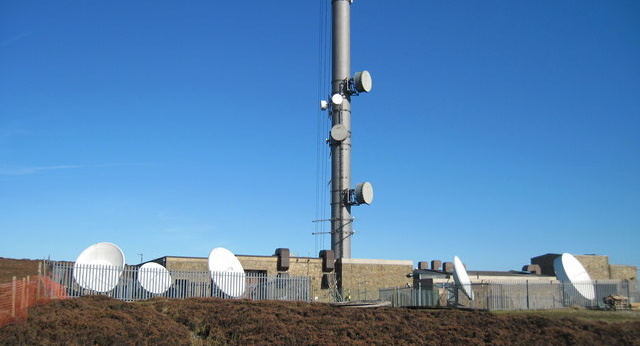
Residents across swathes of North Yorkshire could be facing a minimum of two more months without a television signal due to the construction time in erecting a replacement mast and because of the need to follow international regulations protecting the sensitive moorland, it has emerged.
While it had initially been suggested an 80m temporary transmitter to replace the Bilsdale transmitter – which was severely damaged by a fire on August 10 – would take three weeks, a meeting of the North York Moors National Park Authority heard its construction was some way from starting and would take a month alone.
Members were told many people living in the North-East and Cumbria BBC area of North Yorkshire south of Teesside had no signal and that escalating frustrations over that had been exacerbated in the Bilsdale area by the lack of a mobile phone signal as a result of the fire.
Although a replacement mast would not need to go through planning process, international environmental regulations mean that the development must not harm the sensitive moorland habitat.
The meeting saw the authority’s members and officers agree to do everything in their power to accelerate the erection of the temporary mast, including delegating any necessary decision-making powers to the authority’s most senior officers to bypass committee meetings.
However, the meeting heard Arqiva had been concentrating their contacts with the landowners, Mexborough Estate, to overcome access issues, and had not contacted the national park authority until several weeks after the fire over dealing with potentially time-consuming International regulations over the site.
The authority’s director of planning Chris France said that as far as he was aware the 309-metre guyed mast structure, which was opened in 1969, appeared to be beyond repair with “a huge bulge in it”, leaving it so insecure a 400-metre exclusion zone had been created around it.
Arqiva are targeting using a disused quarry on the moor to the south of the exclusion zone for an emergency mast because that would have least impact on the biodiversity.
Mr France said that emergency national planning regulations allowed replacement masts as long as they were movable without the need to go through the planning process. Arqiva has proposed to put it on sleds, weighed down by large blocks of concrete flown there by helicopters. The structure would then be secured by guys attached to the surrounding heather moorland.
Nevertheless, as the site is designated as a Site of Special Scientific Interest, and had been classified as a European Special Protection Area and a Special Area of Conservation since the mast was built, Arqiva consultants have asked whether it is necessary to screen the development for environmental and habitat impacts.
Mr France said if screening processes are deemed necessary the timescale for any consultation may take a further month.
However, he added as the temporary mast would not be permanently tied down it would not be suitable over the winter at such a height and exposed location and after three months, Arqiva had indicated “another replacement replacement mast” may be required which they said would be subject to full planning permission.
The meeting heard a second complication was that the mast had mobile phone equipment on it and people living and working in the area had been left with no signal. Members were told mobile phone operators were now searching for places to put a mast up.
A spokesman for Arqiva said as Bilsdale is a Site of Special Scientific Interest to replicate what is there would not be a simple task.
He said: “The legal process to secure appropriate access to the site to build the temporary mast is taking longer than we initially anticipated and as a result it will not be operational by this weekend as we’d hoped.
“We are making representations to the court as to the severity and the urgency of the situation, but we are in the hands of the judicial system currently.”
In its latest update yesterday, Arqiva confirmed a signal had now been restored to viewers who used its Bainbridge relay site.
TV provider Freeview said residents in and around Richmond, Catterick and Leyburn should try retuning their TVs if they still didn’t have a signal.
A spokesperson said on Thursday: “If you are served by the Rookhope, Castleton or Bainbridge relay transmitters, you should now see your signal restored following engineering work today.
“If you’re in Hartlepool, Middlesbrough, Redcar, Stockton, Darlington, Barnard Castle, Richmond, Leyburn, Catterick, Masham or Ripon, you may be able to receive more channels following engineering work at the temporary transmitters serving your areas.
“You may need to retune your TV set to ensure your channel list is up to date.”
For advice on how to retune visit: www.freeview.co.uk/bilsdale
The company added: “While engineering work continues to improve the coverage options, we have also set up a devoted freephone number 0800 121 4828, which will take callers through the latest news and viewing options available to them.”
The company said the freephone was a recorded update aimed at making sure that viewers who don’t have access to the internet can easily check if there are any updates for their area, whenever they need to.
“Alongside this, our adviceline is still available on weekdays for anyone who can’t get online and who needs more detailed help.
“With some homes still without service, we want to thank viewers who live in the local area for looking out for those who may still be isolated from their usual source of information and companionship, and for continuing to help us to keep these viewers informed.”


Be the first to comment